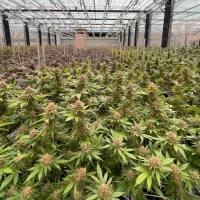
The effort may face fierce resistance from the marijuana industry, which accused hemp leaders of trying to roll back cannabis legalization amendments ‘all in hopes that politicians will eventually replace it with something down the road’
BY: REBECCA RIVAS
Missouri Independent
A group of Missouri hemp business leaders are organizing an initiative petition to allow marijuana and intoxicating hemp THC products to be sold in the same stores as alcohol and tobacco.
The goal of the effort, led by Kansas-City-based hemp business American Shaman and announced on an industry call Monday, is to repeal the 41-page constitutional amendment that legalized recreational marijuana in 2022. It would replace it with language that instructs Missouri lawmakers to create regulations that are “no more burdensome than what we already have for alcohol and tobacco,” industry lobbyist Eapen Thampy said on a call with about 30 business owners and cannabis activists Monday morning.
“Part of the idea here is to remove that regulatory mandate in the Missouri Constitution,” he said. “We devolve regulatory authority back to the Missouri General Assembly, the elected representative of the people where it belongs.”
The petition language hasn’t been finalized yet, Thampy said, but it will ensure that cannabis remains legal until state lawmakers come up with laws regulating marijuana and intoxicating hemp products. It would take out criminal offenses for possessing too much marijuana but retain all the current taxes on the products.
It would also allow businesses to obtain licenses to sell the products through a similar process as they do with alcohol and tobacco products. Currently marijuana facility licenses are limited and highly regulated, but businesses don’t need a license to sell intoxicating hemp products — despite numerous legislative attempts to outright ban them.
The group is aiming, he said, to have the initiative petition language drafted in the next week, submitted to the Missouri Secretary of State by August with enough signatures by May to appear on the November 2026 ballot. It’s being organized under a new political committee called Missourians for a Single Market, formed last week.
The group’s announcement is the latest in the showdown between the marijuana industry — which has operated legally in Missouri since 2018 but is outlawed federally — and the hemp industry, whose products were legalized by the 2018 Farm Bill.
Thampy acknowledged the hemp industry’s feeling of uncertainty after Missouri Attorney General Andrew Bailey sent several cease-and-desist letters to companies selling a hemp product called THCA flower that looks exactly like marijuana flower sold at dispensaries.
Bailey’s letters threaten legal action, including injunctions, civil penalties and attorney’s fees if the companies continue to sell the products.
“When purchasing products, Missourians deserve to know if they are being exposed to dangerous side effects like psychotic episodes, hallucinations or other life-threatening risks,” Bailey said in a statement to The Independent last week. “We have issued 18 cease and desist letters so far, and more are forthcoming.”
Thampy claims the initiative petition campaign will bring more unity between the two industries after being at odds for several years over legislation that could potentially ban intoxicating hemp products in Missouri.
“We want to give the marijuana operators an opportunity to pursue the consumer dollar in the mass market, as the hemp side already does,” Thampy said.
However, Andrew Mullins, executive director for the Missouri Cannabis Trade Association, called the idea a “bait and switch.”
The state’s regulated marijuana industry, he said, generated $241 million in state and local tax revenues last year alone and is regarded as one of the most successful marijuana programs in the country, citing a Wall Street Journal article.
Voters have twice voted for cannabis regulation, he said, and any effort to roll back those constitutional protections would be a “spectacular failure.”
“Missourians aren’t about to take hundreds of millions away from local communities, veterans and our justice system, all in hopes that politicians will eventually replace it with something down the road,” Mullins said.
Thampy said that tax revenue wouldn’t go away. The taxable market would increase by about a third, he said, “meaning tens of millions in new revenue for public defenders, substance abuse prevention, and the Missouri Veterans Commission.”
Steve DeAngelo, a California-based marijuana advocate involved in multiple successful legalization campaigns, said during Monday’s call that the effort also will help unify those currently working in the “legacy” market, more commonly referred to as the black market.
“When you bring down the barriers to entry, all of the legacy folks who are right now out of the legal system would be able to come in,” he said. “So you create one single, unified market for cannabis across all sectors. That’s the proposal that I have to advance now.”

